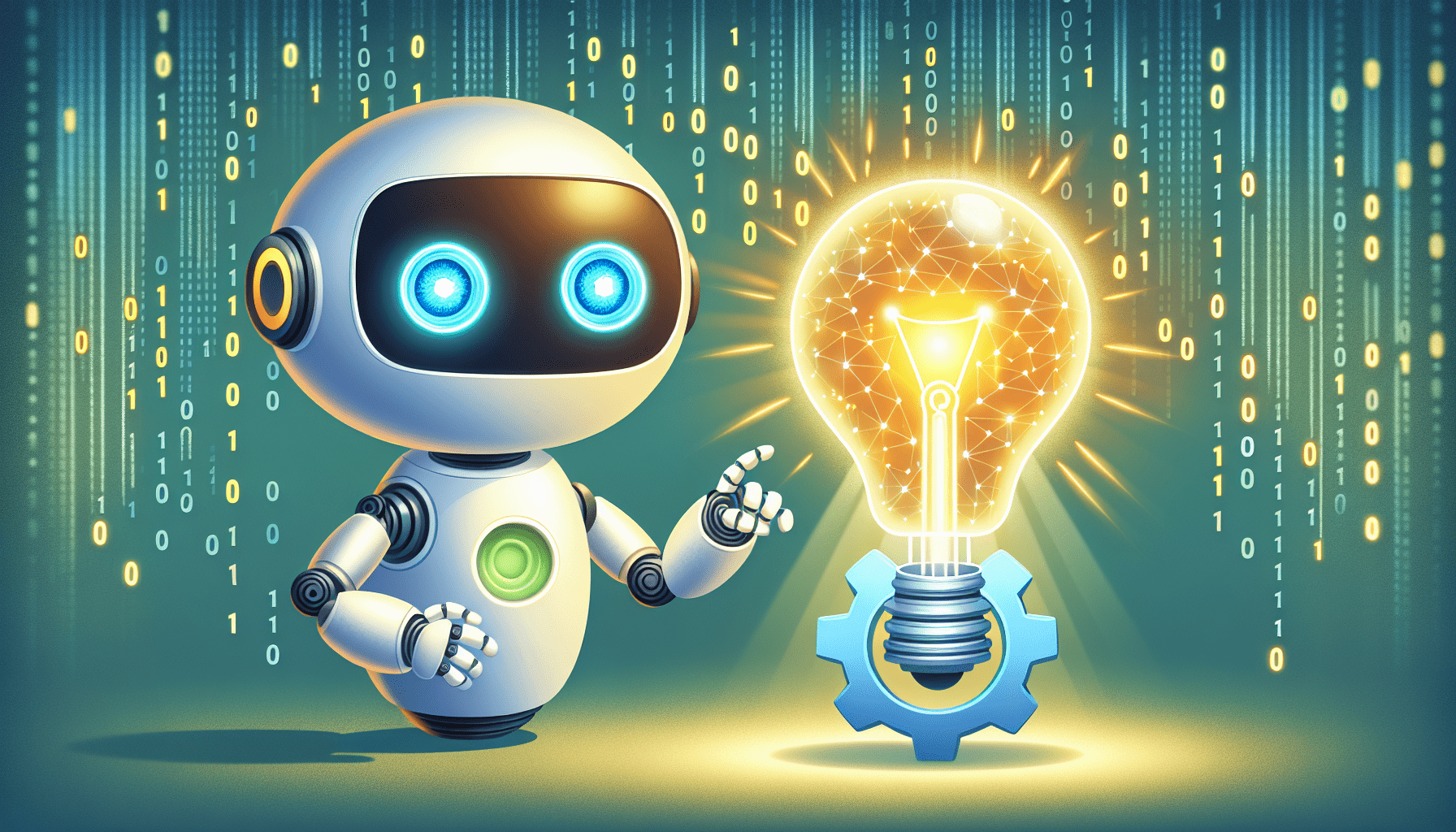Are you curious about diving into the fascinating world of Artificial Intelligence (AI) but feeling overwhelmed by complex learning methods? Look no further! In this concise article, we will guide you through the basics of AI, providing simple learning methods that will help you grasp the foundations of this exciting field. Whether you are a beginner or looking to expand your knowledge, this article will equip you with the essential tools to navigate the world of AI with ease. So, let’s embark on this exciting journey together!

Understanding AI
What is AI?
AI, or Artificial Intelligence, refers to the simulation of human intelligence in machines that are programmed to think and learn like humans. It encompasses a wide range of technologies and methodologies that enable computers to perform tasks that typically require human intelligence, such as visual perception, speech recognition, decision-making, and problem-solving.
How does AI work?
AI systems work by utilizing vast amounts of data and complex algorithms to recognize patterns, make predictions, and take actions. These systems are designed to learn and improve over time, adapting to new information and evolving circumstances. AI algorithms can be categorized into two broad types: supervised learning and unsupervised learning. Supervised learning involves training a model on labeled data, while unsupervised learning focuses on finding patterns in unlabeled data.
Different types of AI
There are different types of AI that serve different purposes. Narrow AI or Weak AI refers to AI that is specifically designed to perform a single task or a limited set of tasks, such as voice recognition or image classification. On the other hand, General AI or Strong AI aims to possess the same level of intelligence as a human, capable of understanding, learning, and performing any intellectual task that a human being can do.
Benefits of Learning AI
Enhanced problem-solving abilities
Learning AI can significantly enhance your problem-solving abilities. By understanding AI algorithms, you can develop the skills to break down complex problems into smaller, more manageable components. This enables you to formulate intelligent solutions by leveraging the power of machine learning and data analytics.
Automating repetitive tasks
AI can help automate repetitive tasks, freeing up your time and allowing you to focus on more creative and valuable endeavors. With AI, you can develop intelligent systems that can analyze and process vast amounts of data, perform routine tasks, and make recommendations, ultimately increasing efficiency and productivity.
Improving decision-making processes
AI provides the tools and techniques to improve decision-making processes in various domains. By utilizing machine learning algorithms, predictive models, and data analysis, AI can help identify patterns, predict outcomes, and make data-driven decisions. This empowers individuals and businesses to make more informed and accurate judgments.
Creating innovative solutions
Learning AI opens up a world of opportunities to create innovative solutions to complex problems. With AI, you can develop intelligent systems that can revolutionize industries, improve healthcare, enhance transportation, optimize manufacturing processes, and transform numerous other areas of human endeavor. By applying AI techniques, you can unlock new possibilities and bring impactful change to the world.
Getting Started with AI
Prioritize foundational knowledge
Before diving into AI, it is crucial to acquire a solid foundation of knowledge in mathematics, statistics, and computer science fundamentals. Understanding concepts such as linear algebra, calculus, probability theory, and programming principles will provide you with a strong basis for comprehending AI algorithms and techniques.
Explore popular AI frameworks and libraries
To get started with AI, familiarize yourself with popular AI frameworks and libraries. Frameworks like TensorFlow, PyTorch, and Keras provide a comprehensive set of tools and resources for building, training, and deploying AI models. Libraries such as NumPy and Pandas offer powerful data manipulation and analysis capabilities, which are essential in AI development.
Gain programming skills
Programming is a fundamental skill for AI development. Learning programming languages like Python, Java, or R will enable you to implement AI algorithms, manipulate data, and build AI applications. Understanding concepts such as variables, functions, loops, and conditional statements is essential for writing efficient and effective AI code.
Build a strong mathematical foundation
AI heavily relies on mathematical concepts and techniques. Building a strong mathematical foundation will help you grasp the underlying principles of AI algorithms. Develop your understanding of linear algebra, calculus, probability theory, and statistics, as they form the core of many AI methodologies and models.
Simple Learning Methods for AI
Online AI courses and tutorials
Online AI courses and tutorials offer a convenient and flexible way to learn AI at your own pace. Platforms like Coursera, Udemy, and edX provide a wide range of AI courses taught by industry experts. These courses cover various topics, including machine learning, deep learning, natural language processing, and computer vision.
Interactive coding platforms
Interactive coding platforms like Codecademy and DataCamp offer hands-on learning experiences with AI coding exercises. These platforms provide real-time feedback and guidance, allowing you to practice AI programming skills while working on practical projects. They also offer interactive coding environments to experiment with different AI algorithms and techniques.
AI coding bootcamps
AI coding bootcamps provide immersive and intensive learning experiences, helping you rapidly acquire AI skills. These programs often have a highly focused curriculum, covering topics such as machine learning, neural networks, and data analysis. Bootcamps also provide opportunities for hands-on projects and real-world applications of AI.
Participating in AI competitions
Taking part in AI competitions can be an exciting and challenging way to learn AI. Platforms like Kaggle and Topcoder host a variety of AI challenges and contests where participants compete to develop the best AI models. By participating in these competitions, you can gain practical experience, learn from experienced participants, and potentially receive recognition for your achievements.
Developing personal AI projects
Developing your personal AI projects allows you to apply your learning in a practical setting. Identify areas of interest and applications you are passionate about, and set clear project goals and milestones. Research and implement relevant AI techniques, and iterate on your projects while seeking feedback and learning from failures.

Online AI Courses and Tutorials
Choosing reputable online learning platforms
When selecting online AI courses and tutorials, it is essential to choose reputable learning platforms. Look for platforms that partner with leading universities or have a track record of delivering high-quality content. Read reviews, check the credentials of the course instructors, and ensure the platform offers comprehensive resources for AI learning.
Exploring beginner-friendly AI courses
For beginners, it is advisable to start with beginner-friendly AI courses that provide a solid introduction to the field. Look for courses that cover essential topics such as machine learning algorithms, neural networks, and data preprocessing. These courses often offer step-by-step explanations, examples, and practical exercises to build your foundational knowledge.
Following structured learning paths
To ensure a well-rounded learning experience, consider following structured learning paths provided by online platforms. These paths typically offer a curated sequence of AI courses that progress in difficulty and complexity. Following a structured path helps you build a comprehensive understanding of AI concepts and techniques and ensures you cover all the necessary topics.
Engaging in practical exercises and projects
To reinforce your learning, actively engage in practical exercises and projects provided in online AI courses. These exercises often involve implementing AI algorithms, working with real-world datasets, and solving AI-related problems. By applying what you learn in a hands-on manner, you develop practical skills and gain confidence in your AI abilities.
Utilizing community forums and resources
Leverage the power of community forums and resources available on online learning platforms to enhance your AI learning journey. These forums allow you to connect with fellow learners, ask questions, and share insights. Additionally, many platforms provide supplemental resources such as cheat sheets, documentation, and tutorials to further support your learning.
Interactive Coding Platforms
Utilizing platforms with AI-specific coding exercises
To sharpen your AI coding skills, utilize interactive coding platforms that offer AI-specific coding exercises. These exercises often focus on implementing AI algorithms, training models, and analyzing data. By working on AI-specific exercises, you gain hands-on experience in solving AI problems and develop proficiency in AI programming.
Accessing real-time feedback and guidance
Interactive coding platforms often provide real-time feedback and guidance as you work on coding exercises. This feedback helps you identify and correct any errors or misconceptions, ensuring that you understand the underlying concepts correctly. Having access to instant feedback accelerates your learning progress and helps you learn from your mistakes.
Collaborating with other learners
Interactive coding platforms often have communities or forums where you can collaborate with other learners. Engaging with fellow learners allows you to share knowledge, exchange ideas, and tackle coding challenges together. Collaborative learning fosters a supportive environment and provides opportunities for learning from broader perspectives.
Tracking personal progress and achievements
Most interactive coding platforms offer progress tracking features, allowing you to monitor your learning journey. These features show your completed exercises, achievements, and areas for improvement. By tracking your progress, you can measure your growth, set goals, and stay motivated throughout your AI learning process.
Exploring curated AI learning paths
Many interactive coding platforms provide curated AI learning paths that guide you through a structured curriculum. These learning paths cover various AI topics and sequentially build upon each other. By following these curated paths, you can ensure a well-rounded AI education that covers the essential concepts and techniques.

AI Coding Bootcamps
Researching and selecting reputable bootcamp programs
When considering AI coding bootcamps, thorough research is essential to select a reputable program. Look for bootcamps with a proven track record, positive student reviews, and industry partnerships. Consider factors such as curriculum, teaching methodologies, mentorship opportunities, and post-bootcamp support to make an informed decision.
Immersive and intensive AI-focused curriculum
AI coding bootcamps offer immersive and intensive programs that focus specifically on AI. These bootcamps cover topics such as machine learning, deep learning, natural language processing, and computer vision. The curriculum is often carefully crafted to provide hands-on experience and real-world applications of AI techniques.
Hands-on projects and real-world applications
AI coding bootcamps emphasize practical learning through hands-on projects and real-world applications. These projects enable you to apply AI techniques to solve problems in various domains. By working on real-world scenarios, you gain valuable experience and develop the skills needed to tackle AI challenges in professional settings.
Networking opportunities within the AI community
AI coding bootcamps often provide networking opportunities by connecting you with professionals and experts in the AI field. This networking can involve guest lectures, industry events, and alumni networks. Building connections within the AI community enables you to learn from experienced individuals, explore career opportunities, and stay updated with industry trends.
Mentorship and expert guidance
One of the significant benefits of AI coding bootcamps is the access to mentorship and expert guidance. Bootcamps often have experienced instructors who act as mentors, aiding your learning journey. These mentors provide personalized feedback, answer questions, and offer insights based on their industry expertise, facilitating your growth as an AI practitioner.
Participating in AI Competitions
Exploring popular AI competition platforms
To engage in AI competitions, explore popular platforms such as Kaggle, Topcoder, and AIcrowd. These platforms host a wide variety of AI challenges and competitions, ranging from image classification to natural language processing. Exploring multiple platforms allows you to discover diverse opportunities for putting your AI skills to the test.
Competing in diverse AI challenges and contests
Participating in AI challenges and contests exposes you to various problem domains and requires you to apply different AI techniques. Compete in challenges that align with your interests, allowing you to explore areas of AI that captivate your curiosity. Embracing diverse challenges broadens your AI skillset and enables you to tackle complex problems creatively.
Collaborating with team members
Many AI competitions allow teams to participate. Collaborating with team members brings in diverse perspectives, complementary skills, and collective problem-solving power. Dividing tasks, sharing knowledge, and pooling resources within a team enhances the overall performance and increases the likelihood of winning competitions.
Learning from experienced participants
AI competitions attract participants with various levels of experience and expertise. Engage with experienced participants, analyze their approaches, and learn from their techniques. Observing their strategies, reading their write-ups, and participating in community discussions can provide valuable insights that help you improve your AI skills.
Gaining recognition and building a portfolio
Achieving success in AI competitions not only brings recognition but also helps you build a solid portfolio of AI projects. Winning or performing well in competitions demonstrates your competency in AI and enhances your credibility in the field. A strong portfolio showcases your practical AI skills and can be invaluable when seeking job opportunities or pursuing further education.

Developing Personal AI Projects
Identifying areas of interest and applications
When embarking on personal AI projects, it is essential to identify areas of interest and applications that inspire you. Consider problems or domains where AI can make a significant impact, such as healthcare, finance, or environmental sustainability. By working on projects that align with your passions, you maintain motivation and find fulfillment in your AI journey.
Setting clear project goals and milestones
To stay focused and ensure progress, set clear project goals and milestones for your AI projects. Establish what you aim to achieve with each project, whether it’s developing an AI model, creating a prototype, or solving a particular problem. Breaking down complex projects into smaller, achievable milestones helps you stay organized and provides a sense of accomplishment.
Researching and implementing relevant AI techniques
Take time to research and understand the AI techniques that are relevant to your project. Explore cutting-edge research papers, review existing AI implementations, and investigate best practices for solving similar problems. Implement the most suitable AI techniques, adapting them to your specific project requirements, and ensure you choose methods supported by robust empirical evidence.
Iterative development and experimentation
AI projects often involve iterative development and experimentation. Rather than aiming for a perfect solution from the beginning, embrace a cyclical process of building, testing, and refining. Incorporate feedback from testing results and make the necessary adjustments. This iterative approach allows you to learn from mistakes, discover new insights, and continuously improve your AI models.
Seeking feedback and learning from failures
Actively seek feedback on your AI projects, whether it’s from mentors, peers, or online communities. Constructive feedback helps you identify areas for improvement, gain new perspectives, and refine your AI models. Embrace failures as learning opportunities, as they provide valuable insights into areas that require further exploration and development.
Continuous Learning and Practice
Staying updated with the latest AI advancements
AI is a rapidly evolving field, with constant advancements and breakthroughs. To stay up to date, actively follow AI news, read research papers, and explore AI conferences and workshops. Engage in online communities and discussion forums to discuss emerging trends and exchange knowledge with fellow AI enthusiasts.
Engaging in continuous practice and coding exercises
Practice is crucial for mastering AI skills. Engage in continuous coding exercises that allow you to reinforce your knowledge and strengthen your programming abilities. Continuously work on AI-related projects, experiment with different algorithms, and seek optimization opportunities. By practicing regularly, you solidify your understanding and improve your problem-solving capabilities.
Joining AI communities and attending meetups
Joining AI communities and attending meetups offers opportunities for networking, knowledge sharing, and learning from industry professionals. Engage in online forums, social media groups, and specialized AI communities to connect with like-minded individuals. Attending meetups, conferences, and workshops further exposes you to the latest trends, insights, and success stories in the AI field.
Collaborating on open-source AI projects
Contributing to open-source AI projects provides a collaborative environment to learn from other developers, contribute to real-world applications, and enhance your coding skills. By actively participating in open-source projects, you gain valuable experience in working on large-scale AI projects, collaborating remotely, and following best practices in software development.
Pursuing further education and advanced courses
To deepen your knowledge and expertise in AI, consider pursuing further education and advanced courses. Universities and online platforms offer specialized AI programs and degrees that provide in-depth education in areas such as machine learning, deep learning, natural language processing, and computer vision. Seeking advanced education can open up new career opportunities and expand your horizons in AI.
By following these methods, you can navigate the world of AI and embark on a rewarding learning journey. Remember to start with a strong foundational knowledge, explore various learning methods, engage in practical exercises, and continuously pursue further education and skill development. With dedication and passion, you can become a proficient AI practitioner and contribute to the exciting advancements in this transformative field.







Leave a Reply